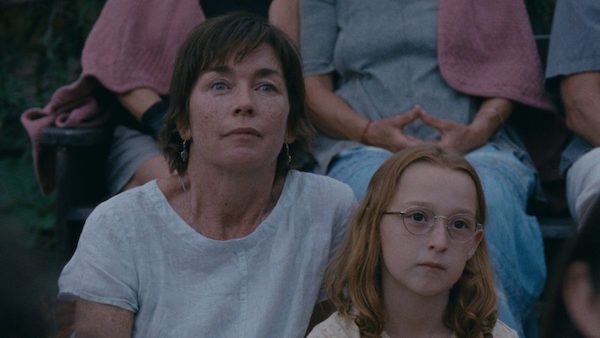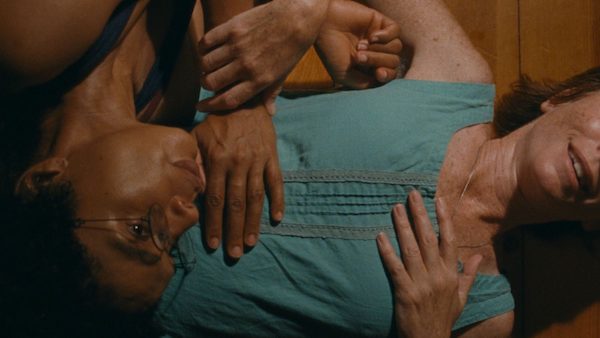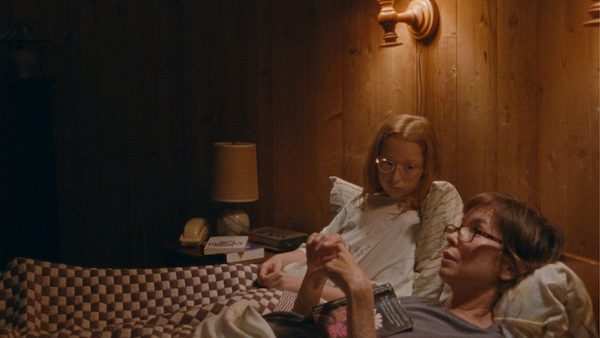Film Review: “Janet Planet” — The Fertile Silence of Awareness
By Tim Jackson
As usual, Annie Baker is more interested in how viewers gather information, gleaned from bits of dialogue, than in wrapping up a neat plot or delivering a message.
Janet Planet, written and directed by Annie Baker. Begins screening on June 27 at Coolidge Corner Theatre, AMC Boston Common 19, and AMC Liberty Tree Mall 20.

Julianne Nicholson and Zoe Zigler in a scene from Janet Planet. Photo: A24
Janet Planet, playwright Annie Baker’s first film as writer and director, draws on fragments of dialogue, casual conversations, and long, reflective silences to focus on the quiet drama of everyday life. Janet Planet, the film’s titular character, is a middle-aged single mother and acupuncturist who lives with her 11-year-old daughter in the woods near Amherst. It is the Massachusetts community known as the Happy Valley. Throughout one summer, Janet stumbles through three relationships under the watchful eyes of her daughter. The narrative makes good use of many of Baker’s signature theatrical strategies: the unease of silence, a fluid sense of time, the presence of totemic objects, sudden revelatory monologues, and a mystical presence that flickers at the story’s edges.
As usual, Baker is more interested in how viewers gather information, gleaned from bits of dialogue, than in wrapping up a neat plot or delivering a message. Her 2014 Pulitzer Prize-winning drama, The Flick, was set in a movie theater where a cleanup crew of two men and one woman go about their everyday chores, holding halting, existential conversations on life and love. In a 2015 interview Baker had this to say about her script John: “I’m going to intentionally make this play kind of in the end make no sense and make total sense at the same time. I really want to stop trying to explain anything to anybody.”
Janet Planet is loosely plotted and the motivations of its characters are often left unexplained. The title figure struggles for a sense of self-satisfaction as she goes about her daily routine as a mother and a healer. Like Baker, Julianne Nicholson grew up in Massachusetts with a single mother; the actress gives a soulful performance. With hooded eyes and freckles, she exudes a sweet sadness that at times seems to come close to tears. Friendships come and go, but Janet and her daughter, Lacy, are bound by trust and love. Each, in their way, is searching for self-acceptance.
An ad inviting girls to try out for the role of Lacy asked: “Casting Lacey (sic): She is herself. Curious, observant, straightforward. Solid in her uniqueness, lives in her imagination. Odd birds welcome.” Baker says “We saw every child actor who spoke English in the world.” Zoe Zigler was cast; it is her first role in a film. It was a remarkable choice: the red-haired Zigler, slightly buck-toothed in wire-rim glasses, is marvelous. Asked why she wanted the role, the actress said it “sounded interesting” and that “I like memorizing lines.” Her character, the viewers’ eyes and ears, is endlessly watchful, curious about how the adult world operates. Our reactions are filtered through her observations. Lacy watches her mother silently, practices Suzuki piano lessons on her miniature keyboard, and delves into imaginative worlds of her own creation. “Why don’t you have any friends,” asks one of her mother’s suitors. Without embarrassment, Lacy quickly responds,“Beats me.” In an interview at the film’s premiere at Lincoln Center, Baker said it was essential that the script avoid the usual female coming-of-age clichés; she wanted to focus on “a kind of intellectual and spiritual development in a little girl” as well as explore the idea of a “mother as love object.”

A scene from Janet Planet. Photo: A24
Janet’s summer friendships are played by three quite dissimilar actors, their characters neatly arranged to contrast with each other. We are given little information about Wayne (Will Patton), a taciturn lover, other than that he suffers migraines and may have a son in Iraq. He offers comically short bursts of chat, and learn that Lacy exacerbates his migraines. Through a crack in the bedroom door one night, Lacy sees Wayne’s hairy bulk filling her mother’s bed. Peering through a window, she witnesses Wayne performing strange dance moves. “I think Wayne’s not feeling well,” she informs her mother. The chapter ends with a simple title: “End Wayne.”
The second relationship is with Regina, an old friend (Sophie Okonedo), who Janet runs into at an outdoor production by a local commune/theater company that features life-size puppets. Regina has been living in the commune and the two women renew their old friendship. Regina moves from the theater collective into Janet’s house, but something in Regina’s past lulls her into drifting. The relationship is fragile. “End Regina.”
The third friendship is with Avi (a brilliant Elias Koteas), the soft-spoken, preachy guru from the puppet commune. One evening at dinner he poses ontological questions filled with whimsical psychobabble. It is the type of off-kilter speech that is a Baker trademark, a monologue that stretches earnestness to the point of absurdity. His philosophical questions and cosmic discourse mesmerize Lacy and Janet — though the friendship will take an unexpected turn.
The most recognized of Baker’s strategies as a writer is her use of silence. Snippets of dialogue will stray in unforeseen directions or lead to inconclusive cul-de-sacs. In one scene, Janet and her daughter lie in bed, each lost in their thoughts. Suddenly, Lacy asks, “Would you be disappointed if one day I dated a girl?” Janet responds, “I always thought you might be a lesbian.” “Why?” the girl asks. Janet supplies a list of traits most often associated with men. This is meant to be an empowering compliment to the girl. Then the conversation takes a quirky but revelatory turn. After a long silence, Janet continues, “I’ve always thought I could get any man to fall in love with me if I really tried.” After a reflective pause: “And I think it’s ruined my life.”
To arrive at these sudden epiphanies, Baker makes use of a minimalist aesthetic that demands patience from the viewer. She slows down the narrative so we will pay heed to the significance of how silence and language interlace. Words are puzzle pieces that oh-so reluctantly offer insight into the inner lives of characters who are in a state of flux, struggling for dreams of transcendence. Writer Paul Goodman prized quiet moments as “the fertile silence of awareness, pasturing the soul, whence emerge new thoughts.” In her essay “The Aesthetics of Silence,” Susan Sontag comes closest to summing up Baker’s artistic strategy: “Silence remains, inescapably, a form of speech (in many instances, of complaint or indictment) and an element in a dialogue.”

Julianne Nicholson and Zoe Zigler in a scene from Janet Planet. Photo: A24
Puppets and figurines appear throughout the film as intimations of transcendence. For Baker, inanimate objects can be brought to uncanny life through a collaboration between puppeteer and the imagination of the viewer. (In Baker’s play John, for example, the stage is filled with shelves of unblinking dolls that take on an otherworldly presence.) Janet and Lacy attend a colorful puppet-powered dance ritual that’s filled with cosmic significance. But its meaning remains comically ambiguous. Later, the pair visit a room filled with giant marionettes that are hanging from the walls of the commune workshop. Every night at home, Lacy feeds grass clippings to her little figurine collection, which is set behind a miniature curtained stage that sits at the head of her bed. Like religious objects, these things possess (for some of Baker’s characters) a mystical energy — inanimate beings offer the freedom to exercise individual acts of imagination and control.
On film, Baker has found a visual and aural equivalent to her use of scant dialogue and silence. People are often shot in puzzling long shots. These visuals alternate with extreme close-ups of eyes, ears, body parts, and faces — we are invited to scrutinize tiny expressions or gestures for small insights. Subjects are often set off to the side of a frame, or rest at the bottom of a composition. Dialogue is occasionally so hushed we have to imagine what is being said. In an interview, Baker said that the ubiquitous bird and forest sounds were meticulously constructed to suggest an Edenic atmosphere.
Janet Planet is filled with nuanced interactions — of character, background, sound, and dialogue — that demand attention. Baker’s usual furtive humor is evident, but overall the film requires thoughtful patience, a kind of radical empathy. One afternoon, during a bucolic picnic, Avi reads from a section of Rilke’s poem “Elegy IV.” He then admits to Janet, “I really like you.” Tellingly, she is more interested in the poem than the man. Janet asks him to “Read it again.”
… and when I feel
inclined to wait before the puppet stage, no,
rather to stare at it so intensely that in the end
to counter-balance my searching gaze, an angel
has to come as an actor, and begin manipulating
the lifeless bodies of the puppets to perform.
Angel and puppet! Now at last there is a play!
Then what we separate can come together by our
very presence. And only then the entire cycle
of our own life-seasons is revealed and set in motion.
Tim Jackson was an assistant professor of Digital Film and Video for 20 years. His music career in Boston began in the 1970s and includes some 20 groups, recordings, national and international tours, and contributions to film soundtracks. He studied theater and English as an undergraduate, and has also worked helter-skelter as an actor and member of SAG and AFTRA since the 1980s. He has directed three feature documentaries: Chaos and Order: Making American Theater about the American Repertory Theater; Radical Jesters, which profiles the practices of 11 interventionist artists and agit-prop performance groups; When Things Go Wrong: The Robin Lane Story. And two short films: Joan Walsh Anglund: Life in Story and Poem and The American Gurner. He is a member of the Boston Society of Film Critics. You can read more of his work on his blog.
Tagged: "Janet Planet", Annie Baker, Elias Koteas, Julianne Nicholson, Sophie Okonedo

I was enthralled by the artwork in this film. All of it, from the many masks, puppets and framed art was as much a part of the dialog as the spoken words., as least it was so for me. I would have enjoyed being able to peruse the pieces in detail at leisure.
The beauty of the Massachusetts countryside was captured so artistically it was evocative of paradise, or the garden of Eden. It was so unfamiliar to me that I actually searched out the location during the first half hour of the movie.